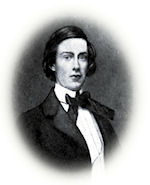
August 1.—This morning the First Maine Regiment, Col. K. J. Jackson, passed through Philadelphia on their way home. Their appearance indicated the hard service which the regiment have had since leaving. They number 780 rank and fife, but intend, on reaching home, to immediately reorganize the regiment, increase the number to one thousand men, and re-enter the service for three years. The soldiers took breakfast at Washington avenue, prepared by the refreshment committee. This regiment passed through Philadelphia about three months ago; they have principally done guard duty on Meridian Hill, and at the Long Bridge, Washington.—Phila. Press, August 2.
—The War Department at Washington received the following direct from Gen. Rosecrans by telegraph, dated to-day:—”Gen. Cox reached Gauley Bridge on the 29th nit. Gen. Wise fled without fighting, destroying the bridge to prevent pursuit. We have captured a thousand muskets and several kegs of cannon powder. Many inhabitants of that section, who have heretofore been strong Secessionists, denounce Gen. Wise for his wanton destruction of property, and are abandoning him and his cause. His Western troops are rapidly disbanding. The valley of the Kanawha is now free from the rebel forces.”—Phila. Inquirer, August 2.
—Jeff. Thompson by proclamation informs the rebels of Missouri, that the North is whipped in Virginia; that “tardy action, like the gentle south wind, will only meet with Northern frosts,” and so invites them to “strike while the iron is hot.”—(Doc. 149.)
—The Twelfth Regiment N. Y. S. M., under the command of Colonel Butterfield, and the Twentieth Regiment, Colonel George W. Pratt, returned to New York from the seat of war. The Eighth Regiment, Mass., reached Boston from the seat of war.—N. Y. Herald, August 2.
—The prize brig Herald, with a cargo of naval stores and tobacco from Beaufort, S. C., bound to Liverpool, and which was captured by the frigate St. Lawrence on the 10th of July, arrived at Philadelphia, Pa. She cleared from Boston, May 27, ostensibly for Turk’s Island, but was then chartered by parties in New York for Beaufort, S. C., with the intent to try the experiment of running the blockade.—N. Y. Evening Post, August 2.
—Scouts returned to Cairo, Ill., from the South, and reported that the rebels at New Madrid were well-armed and drilled. They have five batteries of ten-pound field-pieces, officered by foreigners, and two regiments of cavalry well equipped. General Pillow is in command. He has promised Ex-Governor Jackson to place 20,000 men in Missouri at once. He has also issued a proclamation, full of bombast, to the people of Missouri, declaring his intention “to drive the invaders from the State, and enable her people to regain their rights so ruthlessly taken away by the forces who march under banners inscribed with Beauty and Booty, as the reward of victory.” He says he will show no quarter to those taken in arms.—Phila. Bulletin, August 2.
—New Orleans papers state that a “naval engagement” took place this day at the mouth of the Mississippi River between the U. S. frigate Niagara and “the little Confederate privateer J. O. Nixon;” and that, after an action of twenty minutes, the Niagara crowded on “every inch of canvas she could use, and made regular Manassas-time seaward.”—(Doc. 150.)
—The Onondaga County Cavalry, Capt. Moschell, departed from Syracuse, N. Y., for Washington at 10:20 to-night, to join Col.. Van Alen’s Cavalry Regiment. The company is 80 strong, and is composed of the very best material. A young bride, Mrs. Cook, accompanies them as a daughter of the regiment.—Baltimore American, August 3.
—The Secretary of War at Washington directed the commandant of the forces at Alexandria, Va., that from this day all slaves now in prison at that post be liberated, and that they may be employed on the fortifications and military works, and be paid for as day-laborers in the service of the Government. All other slaves escaping hereafter shall be treated in a similar manner.—Louisville Journal, August 3.
—Governor Gamble of Missouri delivered his inaugural to the Convention of that State. After referring to the personal sacrifices made by him in accepting the office, he calls upon the Convention and the people to give the experiment just made a fair trial. He then gives a vivid sketch of the evils arising from the anarchy with which that State has lately been threatened, assuring them that it will be his sole aim that the people of Missouri can worship God together, each feeling that his fellow-worshipper is not an enemy; that each can meet his neighbor without any conversations on blood and slaughter. The inaugural closes with a strong appeal for the cultivation of confidence and good feeling.—(Doc. 151.)
—The steamer B. P. Cheney was seized by the rebels at Columbus, Kentucky, and carried to the head-quarters of Gen. Pillow.—Louisville Courier, August 10.
—In the Senate of the United States, the bill to suppress insurrection and sedition was taken up, and an exciting debate occurred, in which Mr. Breckinridge and Mr. Baker, of Oregon, took part.—(Doc. 152.)
The St. Louis Democrat of this day gives an account of the preparation and departure of Gen. Fremont’s expedition from St. Louis to Bird’s Point, Cairo, and other positions on the Mississippi River.—(Doc. 153.)
![]()











